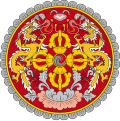This article's factual accuracy is disputed .(April 2024) |
 | |
Bhutan | Russia |
|---|---|
Relations between Bhutan and Russia were established in November 2011.[ citation needed ] An exhibition on Buddhism in Russia ran from November to December 2011, at the Nehru-Wangchuck Cultural Centre at the Embassy of India in Thimphu, Bhutan. [1] [2] This exhibition focused on developing humanitarian and cultural relations between Russia and Bhutan, and has been the first event of its kind in Bhutan. [3] Both countries are strong allies with India.
